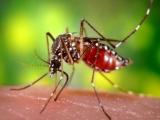Florida Gov. Rick Scott said there were 10 more cases of locally transmitted Zika virus infection diagnosed over the weekend, as Zika control measures seem to be faltering in Miami, according to the Centers for Disease Control and Prevention (CDC).
Active transmission in Miami
Officials from the Florida Department of Health (Florida Health) confirmed today that the 10 cases involved local transmissions, spread by mosquitoes in a small neighborhood north of downtown Miami, according to Scott.
Six of the cases were asymptomatic and found through door-to-door surveillance conducted by Florida Health. The cases bring the total spread by local mosquitoes to 14 in Florida.
"While we continue to learn more about this virus each day, we know that it is most harmful to pregnant women and their babies," Scott said in a statement. "For women who live or work in the impacted area and are either pregnant or thinking of becoming pregnant, I urge you to contact your OB/GYN for guidance and to receive a Zika prevention kit."
Until last week the roughly 1,700 cases of Zika in US states were contracted outside the country or through sexual contact. On Friday, Florida Health confirmed that 4 cases of Zika in Miami were spread by local mosquitoes, and have tested more than 200 people in Wynwood, the affected neighborhood.
In his statement, Scott also called on the CDC to activate a CDC emergency response team (CERT) to help with mosquito surveillance, trapping, and control efforts.
Still, he emphasized that Florida was "open for business," even after Public Health England warned pregnant women this weekend to halt nonessential travel to Florida.
"While I encourage all residents and visitors to continue to use precaution by draining standing water and wearing bug spray, Florida remains safe and open for business," said Scott. "This year, we have already welcomed a record 30 million tourists and we look forward to welcoming more visitors to Florida this summer."
High Aedes counts despite spraying
In a briefing today, CDC Director Tom Frieden, MD, MPH, said there was a CERT being deployed to Miami this afternoon, adding that the agency was issuing a travel ban for pregnant women to the 1-mile area where local transmission has been observed. This is the first time the CDC has issued a travel ban in the continental United States.
"What we have learned in the past 48 hours is that mosquito control efforts haven't been effective as we hoped in Miami," said Frieden.
Frieden said there were a few possible reasons mosquito control experts were still seeing moderately high numbers of Aedes despite daily spraying. First, the mosquitoes could be laying eggs in "cryptic reservoirs" that were hard to find and target (eg, bottle caps in a person's backyard). More worrisome, Frieden said there could be resistance to the insecticides used. Testing results on the effectives of individual insecticides being used in Miami won't be available for another 1 to 2 weeks, he said.
Because 4 out of 5 infections with Zika are "silent" or asymptomatic, Frieden said protecting pregnant women or those who are considering pregnancy remains the main goal of the CDC's Zika policy.
"Pregnant women should not travel to this area," said Frieden. "Pregnant women who live in this area need to take every step to prevent mosquito bites or sexual transmission. And pregnant women who traveled to this area on or any time after Jun 15 need to be tested for Zika."
Frieden said that based on epidemiologic questioning, Jun 15 is the earliest date of possible local transmission in Miami. In addition to the travel ban, the CDC is recommending Zika testing for all pregnant women in the continental United States at prenatal visits in their first and second trimesters.
Michael T. Osterholm, PhD, MPH, director of the Center for Infectious Disease Research and Policy at the University of Minnesota, which publishes CIDRAP News, said that while he agrees with the CDC's decision to ban travel for pregnant women to a limited area, he warns overreaction could lead to unnecessary restrictions.
"You shouldn't cease all travel to Florida," said Osterholm. "We wouldn't have a travel ban to Minneapolis, because 140 people contract West Nile Virus from mosquitoes each year in Minnesota, and one third of those cases are life-threatening."
Osterholm said aggressive public health measures make travel to wider Florida safe.
See also:
Aug 1 Gov. Rick Scott's statement
Aug 1 CDC press release
Aug 1 CDC travel ban summary
Aug 1 CDC travel advice for Wynwood





















